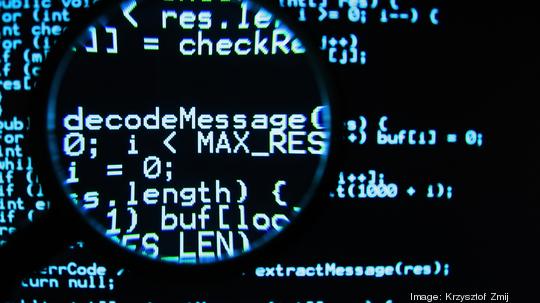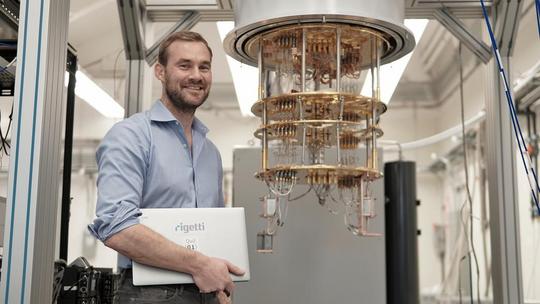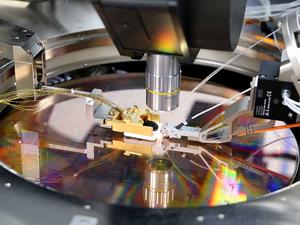
It may seem like today’s computers and smart phones have incredibly fast processing power compared to the days of dial-up internet — and they do — but today's tech still moves at a snail’s pace compared to the promise of quantum computing, which has the potential to exponentially speed up research in all sorts of fields.
In October, Berkeley-based startup Rigetti announced it was going public by merging with a special purpose acquisition company, or SPAC, called Supernova Partners Acquisition Co. It has developed a “first-of-its-kind scalable approach to building quantum processors,” according to a press release, and the deal will value Rigetti at $1.5 billion.
This weekend, IBM CEO Arvind Krishna told Axios that it has achieved a breakthrough in its quantum research and reached 127 qubits: "It is impossible to simulate it on something else, which implies it's more powerful than anything else," Krishna said.
But what is quantum computing?
Traditional computing runs on binary code or "bits" — those 1s and 0s that fire off when you when you open a smartphone app. Even though it appears fast, the bits are processing information in a linear sequence, almost one at a time. Quantum computing runs on "qubits" and the information they contain is processed simultaneously. Think: up, down, backward and forward all at the same time, rather than sequentially.
So how fast is quantum computing and what are its main uses?
In 2019, Google said it had achieved a breakthrough that allowed it to solve a problem that would have taken 10,000 years on a normal computer but took less than four minutes with its 54-qubit processor.
These ultrafast quantum processors have the potential to speed up research for things like treating rare diseases, improving artificial intelligence, speeding up financial simulations and reducing manufacturing errors, according to the Harvard Business Review. They also make modern day encryption technology look like a flimsy padlock. Because quantum processors are unstable and its computations are difficult to replicate, they are hard to hack — but their processing power could make it easier to crack encryption in other places.
How does it work?
As the name implies, it stems from the field of quantum mechanics, a theoretical division of physics focused on atomic and sub-atomic scale particles. But it's essentially the classic thought experiment known as Schrödinger's cat. Multiple states can be true at the same time. And the possibilities grow exponentially with each new cat, I mean, qubit, contained in a box.
The field of quantum computing describes probabilities as "amplitudes" and uses a programming language called "quil" which enables these supercomputers to communicate with traditional PCs.
These supercomputers have to be kept isolated from external contaminants to prevent what's called "decoherence" — a process that leads to wrong outcomes. And the rooms where they are stored are kept incredibly cold at absolute zero.
What's the history of quantum computing?
Scientists have been exploring the possibility of “quantum information” as early as the late 1960s, and the first research papers on the subject were published in the 1970s and 1980s, according to the Stanford Encyclopedia of Philosophy.
In the 1980s, research continued at both public and private institutions including IBM, the University of Oxford, the California Institute of Technology and the Argonne National Laboratory (also known for its work on nuclear energy).
By the 1990s, researchers were experimenting with algorithms that might lead to practical applications. The field is still largely theoretical but interest, and funding, for the industry has continued to grow since the early 2000s.
What terms do I need to know to understand the technology?
- Amplitude: a range of potential outcomes or probabilities
- Binary: the basic language of modern day computers which consists of various combinations of 1s and 0s.
- Decoherence: a process of contamination which causes quibits to become unstable leading to lost data.
- Quantum supremacy: the point at which quantum computers can outperform modern supercomputers.
- Qubit: a measurement of processing power in quantum computers
- Quil: the basic language of quantum computers
How much investment has gone into the field?
According to Scientific American, the U.S. and China are both investing an estimated $100 million annually in quantum research.

Who’s leading the field?
There are 165 startups working in the quantum computing space, according to Crunchbase. Of those, 15 are located in the Bay Area. Several Big Tech companies have dedicated teams doing quantum research, too.
- Rigetti — Rigetti is developing scalable quantum technology and says it currently operates with 80 qubit processors. It wants to reach 4,000 qubits by 2026.
- Google — In early 2021, Google unveiled its quantum AI research campus in Santa Barbara and said it would "build a useful, error-corrected quantum computer" within 10 years and is trying to build a system that utilizes 1 million qubits. In 2019, Google said it had already achieved quantum supremacy.
- IBM — the company says it offers 65 qubits of functional processing capabilities for partners through its cloud, and its fastest quantum processor that can run on 127 qubits will be available for partners via its cloud services in late 2023. In 2020, IBM said it was aiming to develop a 1000 qubit processor within three years.
- Intel — At the end of 2020, Intel said it had replaced bulky quantum computing setups with a system-on-a-chip design that will enable and accelerate scalability.
How far are we away from commercial release?
So far, quantum computing breakthroughs have been limited to research environments but the industry could start using the technology in practical application by 2030, according to CB Insights.
How big is the market?
According to Pitchbook, the quantum computing industry was estimated to be worth $340 million in 2020 and could rocket to nearly $9 billion in value by 2030.





